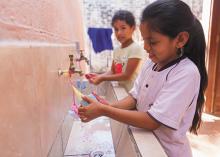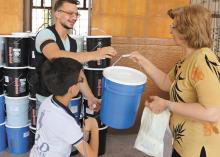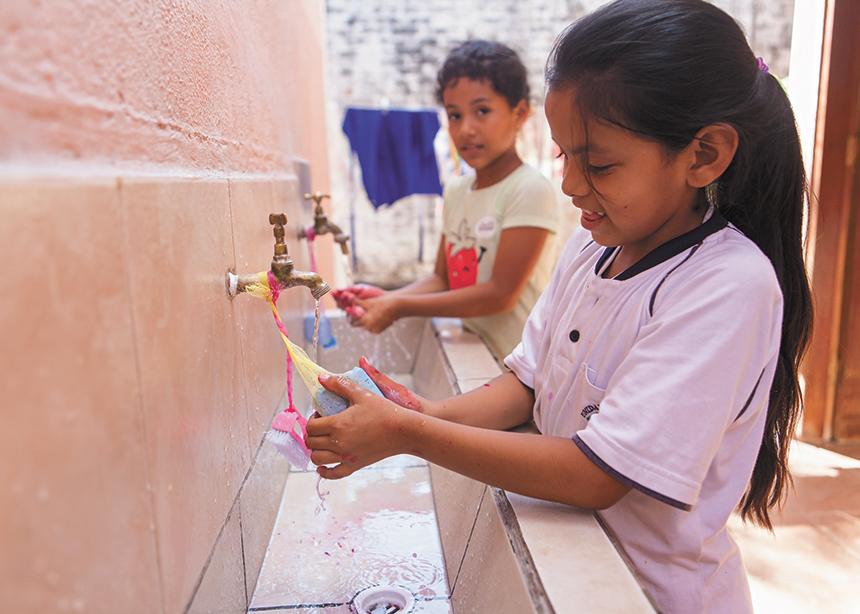As COVID-19 spreads and worsens, Mennonite Central Committee (MCC) continues its worldwide work while attending to the health and well-being of its staff.
MCC is well positioned through its ongoing water, sanitation and hygiene (WASH), health and food programs to address the threats of the novel coronavirus for some of the world’s most vulnerable people, including people displaced from their homes. In times of crisis, those who are most vulnerable suffer the most. Where possible, the organization is scaling up this work.
Many of its partner organizations bolster health efforts by providing training about nutrition, hygiene and disease prevention, and by strengthening access to food and clean water. MCC also supports several hospitals and clinics that serve people already at risk.
“Much of the work that MCC does around the world with vulnerable populations is helpful in a pandemic like COVID-19,” says Paul Shetler Fast, MCC’s health coordinator.
“The principles of MCC’s work in WASH are helpful across a broad range of infectious diseases, including epidemics like cholera, Ebola and now COVID-19,” he says. “Just as we here in Canada and the U.S. are being reminded to wash our hands and practise good hygiene to prevent spread, our WASH partners around the world are working on these same types of issues. This is a truly global pandemic impacting every corner of the world.”
To help people who have been displaced by war or other disasters, MCC sends hygiene kits and relief kits. Hygiene kit shipments are on their way to Jordan, Ukraine and Mozambique, says Bruce Guenther, MCC’s director of disaster response.
Locally purchased hygiene supplies will be distributed to displaced people in Lebanon, Syria and Malawi along with food packages that were already scheduled, he says. To decrease the health risks to partner staff and volunteers who distribute supplies, MCC is providing locally purchased masks and gloves, adding extra handwashing stations at some distribution points and adapting distributions to ensure physical distancing.
MCC’s food distributions and agricultural work remain critical, Shetler Fast says. “As Canadians and Americans are realizing the fragility of our supply chains, seeing grocery stores emptied, our food security and malnutrition partners around the world are trying to ensure that the most vulnerable families can access the basic nutrition their bodies need to fight off a new pathogen.”
For example, 250 families living at the Mubimbi camp in the Democratic Republic of the Congo will continue to need food distributions to supplement the crops they can grow in fields rented for them by MCC’s partner Église du Christ au Congo (Church of Christ in Congo).
They need the nutrition, Shetler Fast says, because “people who are malnourished have weakened immune systems and are particularly at risk for COVID-19.”
One MCC-supported mobile clinic serves the people of Mubimbi and the neighbouring Poste camp, where people went to escape violence from armed groups in their rural home communities. The nurses are equipped to help people recover from malaria and other common illnesses. Now they will need to be alert to any signs of COVID-19, so they can refer them for a higher level of care.
MCC also supports clinics and hospitals in other countries whose focus is on primary care, emergency medicine, maternal and child health, HIV-AIDS and mental health treatment.
“These health providers are on the front line as their communities are impacted by COVID-19—not only helping in some cases with prevention and treatment, but also dealing with the rippling health impacts of the pandemic for vulnerable groups,” says Shetler Fast.
Shuttered thrift shops, cancelled relief sales
Yet the spread of the coronavirus is forcing MCC to carry out its ministry with less funding, travel and staff in some places.
Domestically and internationally, staff are telecommuting wherever possible, continuing MCC’s work with partners and constituents virtually. Training and meetings have been cancelled, postponed or moved to virtual events.
In some countries, such as India and South Africa, where governments have issued nationwide lockdowns, MCC’s work is limited. Getting canned meat and other supplies to nursing homes and hospitals in North Korea has been delayed because of a closed port.
MCC is not suspending or ending international assignments at this time, but some participants in its young adult programs—Seed, Serving and Learning Together (SALT), International Volunteer Exchange Program (IVEP), and Young Anabaptist Mennonite Exchange Network (YAMEN)—have chosen to end their assignments and return home early. MCC is actively helping all personnel who make this decision, as well as those who remain.
Its thrift shops in Canada and the United States are temporarily shuttered, drying up funding that averaged more than $1.7 million a month in 2019. Ten relief sales have cancelled or postponed sales this spring, events that last year brought in more than $2.4 million.
Material resources centres across Canada and the U.S. are closed to the thousands of volunteers who come each week to sew comforters and prepare hygiene kits and other items for shipping overseas. Nevertheless, it has a three-month reserve of kits and comforters ready to be sent.
The 2019-20 meat-canning season ended in March instead of April, but, with 500,000 cans of meat, it’s enough to meet the requests from partner organizations for the next 12 months, says Tom Wenger, MCC’s material resources coordinator.
MCC’s work in Canada and the U.S. has been limited by the pandemic, but working with marginalized groups remains a priority. In Canada, getting information about COVID-19 to refugees and returning Low German-speaking people, as well as monitoring the condition of remote First Nations groups, is ongoing.
So far, only a few centennial celebrations have been postponed or cancelled, but organizers of alumni gatherings and other celebrations will be following the advice of local health authorities and other government guidelines as the pandemic evolves.
“Times of uncertainty call us to dig deeper into faith—to cast all our anxiety on God because God cares so deeply for us,” says Rick Cober Bauman, executive director of MCC Canada. “We believe this is a time to recommit ourselves to caring for our neighbours and acting generously—whether in our homes, across the street or around the world.”
MCC is advocating with Canadian and U.S. governments to increase their assistance to people internationally who have been displaced from their homes and is calling on people of faith to encourage their legislators in this.
Donations to support the ongoing work of MCC, including its intensified work in response to COVID-19, can be designated to “where needed most” at mcccanada.ca/donate.
Related story:
Four ways MCC is responding to COVID-19

Thiciano Pareja Saucedo, 8, washes her hands at El Comedor de Niños, an after-school program for children in the Montero area of Bolivia, about an hour from Santa Cruz. One of its main goals is to improve nutrition and health outcomes in the community by teaching children about healthy eating, gardening and hygiene. (MCC photo by Matthew Sawatzky)

Middle East Council of Churches, an MCC partner, distributed MCC relief kits, which contain hygiene supplies, to the most vulnerable displaced people and host community members in a neighbourhood in the Syriac Orthodox diocese in Aleppo, Syria, in 2016. This year, MCC’s partners in Syria and Lebanon will distribute individual hygiene kits and food to help people protect themselves from the novel coronavirus. Names are withheld for security reasons. (Photo courtesy of MECC)


Add new comment
Canadian Mennonite invites comments and encourages constructive discussion about our content. Actual full names (first and last) are required. Comments are moderated and may be edited. They will not appear online until approved and will be posted during business hours. Some comments may be reproduced in print.